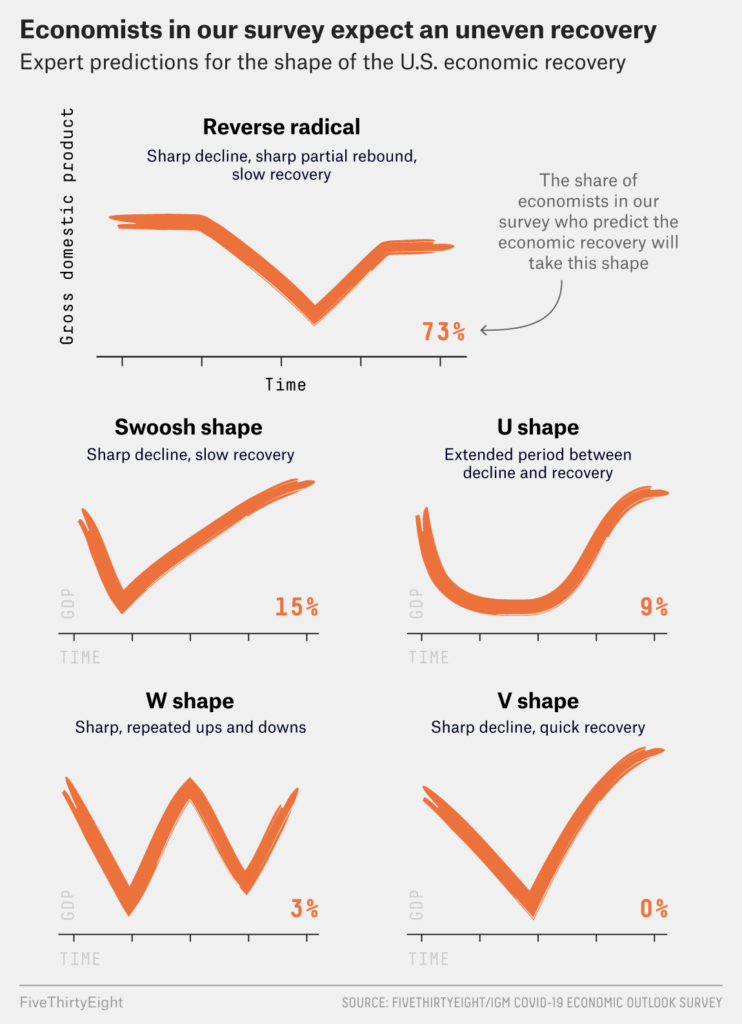Thursday in Whitewater will be partly sunny with a high of eighty-two. Sunrise is 5:17 AM and sunset 8:37 PM, for 15h 19m 21s of daytime. The moon is waxing crescent with 19.6% of its visible disk illuminated.
Today is the one thousand three hundred twenty-fifth day.
Whitewater’s CDA board meets at 5:30 PM via audiovisual conferencing.
On this day in 1950, the Korean War begins after North Korea invades South Korea.
Recommended for reading in full —
Neil Paine and Amelia Thomson-DeVeaux write What Economists Fear Most During This Recovery:
In partnership with the Initiative on Global Markets at the University of Chicago Booth School of Business, FiveThirtyEight asked 34 quantitative macroeconomic economists what they thought about a variety of subjects around the coronavirus recession and recovery efforts. The most recent survey, which was conducted from June 19 through 22, echoed many of the predictions from the last round — though there were also a few new wrinkles in their forecasts.
When we first asked about the shape of the recovery, 58 percent of respondents thought the trajectory of future U.S. gross domestic product looked like a Nike “swoosh” — a sharp downturn followed by a long, slow recovery. This time around, however, a consensus has formed around a slightly different shape: a reverse radical (i.e., a mirrored version of the square-root symbol).
This shape — which 73 percent of our economists predicted for the country’s economic future — implies a steep drop followed by a quick partial recovery and a longer period of slower, mixed growth. But it isn’t necessarily an improvement over the swoosh. “There is nothing standard or smooth about this recovery,” said Lisa Cook, professor of economics and international relations at Michigan State University. In her view, a reverse-radical-shaped recovery could be shaped by a spike in infections and hospitalizations, a wave of bankruptcies as unemployment benefits expire or consumers’ unwillingness to return to gyms, nail salons or other parts of their routine. That could make the bounce back from this recession bumpier than previous recessions.
Radley Balko writes Both parties’ police reform bills are underwhelming. Here’s why:
The Republican bill places no restrictions on the dangerous practice of no-knock raids. Instead, it asks that states collect data. The Democratic bill bars the use of no-knock warrants for federal drug investigations and cuts funding for any state or local jurisdiction that doesn’t do the same. But the Democrats’ bill requires only that police officers execute drug warrants “only after providing notice of his or her authority and purpose.” This “knock and announce” requirement is all but meaningless if you know that police officers frequently do so either simultaneous with or just seconds before entering. (The cops who killed Taylor, for example, claimed they did knock and announce.) A truly meaningful reform would go further and bar any forced entry into a private residence unless the police have reason to suspect someone inside presents an imminent threat to others, such as an active shooter, a kidnapping or a robbery in progress.
Neither bill satisfactorily provides for changing the current reality that bad cops are rarely held accountable. Derek Chauvin, the officer who knelt on Floyd’s neck, had 17 misconduct complaints in 18 years. He received only two letters of reprimand. The New York Times reported that since 2012, the Minneapolis Police Department received over 2,600 civilian complaints of police misconduct. Just 12 were upheld. This is consistent with other surveys of police departments across the country.
Six critically ill Covid-19 patients would overwhelm this Texas hospital:


